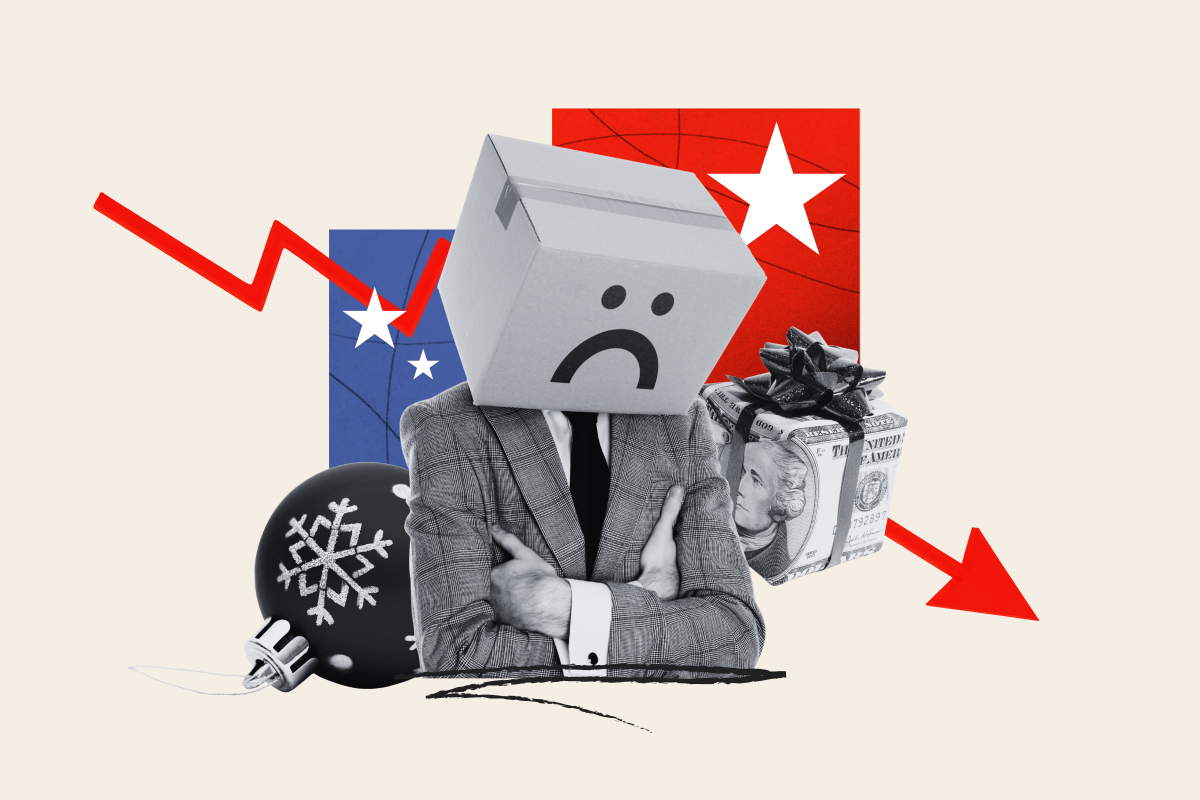
America’s retailers may be in for a less-than-jolly holiday season, as broad-based financial strains subdue the Christmas shopping spirit, and tariffs make it tougher for businesses to court the cash-strapped consumer.
Industry forecasts have already made clear that the holiday season—the most crucial sales period for industries of all stripes—will be muted at best. A consumer survey from PricewaterhouseCoopers found that shoppers plan to spend 5.3 percent less this year, comparable to the 7.6 percent drop seen in 2020. Deloitte projects November-to-January sales rising between 2.9 percent and 3.4 percent, the slowest pace of growth since the pandemic.
While Mastercard anticipates spending growth broadly in line with 2024, it noted in its report that a larger share of this will be a product of inflation—and the relative increase in the price of goods—rather than a genuine uptick in shopping activity.
And beyond altering the data, inflation will be among several factors shaping how freely Americans spend this year. The job market shows signs of weakness—both high layoffs and openings—and the financial outlook for many remains bleak. Gifts, though important, remain a vulnerable category when consumers are forced to trim their budgets.
A Holiday Season on Edge
“What I expect given the recent data is that imports and overall spending will be lower than previous years,” said Christopher Meissner, professor of economics at the University of California, Davis. “This is because the labor market is in increasingly bad shape and inflation is running a little high.”
“Inflation, cost pressures, tariff challenges and other stressors such as debt and high interest rates have consumers budget-minded going into the holidays,” Nicole Leinbach Hoffman, founder and president of RetailMinded.com, told Newsweek.
Aabesh De, who successfully pitched his houseplant health company Flora to the Shark Tank investors in 2022, told Newsweek that they have forecast “20 percent lower sales across-the-board, despite our holiday seasons being our strongest,” as a result of the anticipated impacts of tariffs and wider cost-of-living pressures on shoppers.
Jim Umlauf, founder of the pet-friendly automotive accessory business 4Knines, said he has witnessed a “clear shift in consumer behavior” this year that is expected to dull the holiday shopping spirit.
“People are spending less overall and taking longer to commit to higher-dollar purchases,” he said. “As a premium brand, that extended decision-making cycle has been one of our biggest challenges.”
Tariffs Taking a Toll
Beyond potentially adding to the concerns of what Hoffman termed the “budget-minded” consumer, businesses have this year grappled with the prospect of President Donald Trump’s tariffs cutting into their holiday margins, with some resorting to strategic inventory management to soften the blow.
According to the National Retail Federation (NRF), imports are set to decline following a period of intense front-loading as businesses scrambled to stock up ahead of the duties taking effect. September’s cargo figures are expected to be down 6.8 percent year-over-year—these declines growing successively steeper and culminating in a 20.1 percent drop in December.
De told Newsweek that Flora has “scaled back about $70,000 worth of planned imports to next year due to the changes in consumer demand tied with increased volatility with tariffs.”
Beyond shuffling inventory timetables, navigating tariffs may also require difficult holiday pricing decisions—ones that clash with the seasonal need to lure in discount-hungry shoppers.
“We will be increasing our prices on loose leaf tea soon by 15 percent which will hopefully make up for some of the tariff increases but this does not take into account the price increase for shipping and shipping brokerage fees,” said Lisa McDonald, founder of the tea and tea accessory company TeaHaus.
McDonald told Newsweek that the higher tariffs will slash her margins by almost 50 percent on some products, but that raising prices to offset this would mean “many teas and/or products will not be affordable—even to the diehard local supporter.”
As Umlauf of 4Knines explained, staying afloat with price increases without sacrificing the more price-conscious customer “creates a difficult balance between driving volume and protecting profitability.”
Christmas Spirit Endures for Some
Still, America’s largest retailers—those with the requisite financial breathing room—appear confident that they can weather the challenging climate and some have already launched an early round of seasonal discounts.
Last month, Walmart’s CEO told analysts that a robust back-to-school shopping period had given the company confidence going into the holiday stretch, while Macy’s recently upgraded its full-year forecasts despite the challenges of what executives dubbed the “more choiceful consumer.”
And some analysts are similarly upbeat about businesses’ odds going into the holiday. Retail guru Jan Rogers Kniffen told Newsweek that he expects holiday sales to rise by 4 percent year-over-year, but that even if Deloitte’s weaker projections of 3.4 percent growth hold, American companies would “feel pretty darned good about the year.”
“Responsible spenders will be more precautionary in their holiday budgets and prioritize essential spending first, yet spending will take place still,” Hoffman said. “It just won’t be as grand as past years for many, and that adds up for retailers and our collective economy alike.”
Although robust consumer spending in August has buoyed Kniffen’s optimism, a recent analysis by outplacement firm Challenger, Gray & Christmas found that seasonal hiring announcements from U.S. employers have set the stage for retail hiring to fall to its lowest level since 2009.
“While we could see a late hiring push if holiday sales surprise to the upside, the cautious pace of announcements so far suggests that companies are not betting on a big seasonal surge,” Senior Vice President Andy Challenger said.
Consumer spending is estimated to account for over two-thirds of U.S. economic activity, and whether the holiday season delivers a welcome rush or falls flat, the effects could snowball into an issue for retailers, shoppers and the wider U.S. economy.
Read Newsweek’s Interview With Retail Expert Nicole Leinbach Hoffman Below:
How likely is it that holiday sales this year will fall compared to 2024?
“Inflation, cost pressures, tariff challenges and other stressors such as debt and high interest rates have consumers budget minded going into the holidays. E-commerce I suspect will continue to grow positively in sales, but I predict at a slower pace than 2024 during the holiday season. Whether in-store or online, however, I think consumers will be seeking deals and shopping early—stretching out their spending and ultimately, pacing with 2024 but not exceeding total holiday sales by much if any.”
Why might this be—tariffs, broader financial struggles, a combination?
“Economic weakness hits different consumer segments in different ways, with higher-income households likely still spending strongly but middle and lower-income households are more impacted by these pressures. Some households carry student loans, auto loans, credit card debt and mortgages that weigh on their budgets more so than historically due to inflation—ultimately impacting less disposable income for them to allocate towards the holidays. Responsible spenders will be more precautionary in their holiday budgets and prioritize essential spending first, yet spending will take place still. It just won’t be as grand as past years for many, and that adds up for retailers and our collective economy alike. Essentially, our economy has anxiety surrounding it and that impacts consumers’ willingness to spend.”
What might determine this in the weeks leading up to holiday season?
“If wage growth outpaces inflation, that would be a great uptick in the holiday spending sentiment for consumers. To further enhance this, it would be ideal to see interest rates decrease with job openings increasing along the way. This trio of positive economic change would be a holiday gift to all of us.”



